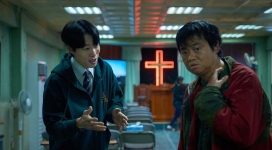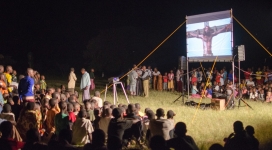
In October 2005, Reverend Philip Olson was diagnosed with an aggressive form of prostate cancer. After searching for a hospital program that would effectively treat him, the Presbyterian Pastor discovered a Cancer Treatment Center of America (CTCA) facility that was still under construction in Philadelphia.
Olson, who has worked with churches for over forty years, reveals that he was drawn to CTCA because while he knew the program would help him physically, it would tend to his spiritual needs as well.
"After beginning radiation treatments at the facility in February of 2006, I had the privilege of receiving spiritual support from the hospital treating me," he said.
After undergoing extensive outpatient treatment including a new diet regime, acupuncture and further radiation, Rev. Olson was declared cancer free. However, the pastor's involvement with the CTCA wasn't over.
Today, Reverend Olson is a full time chaplain on the pastoral care staff with CTCA, where he gives back to the organization that supported him through his cancer. His belief in the organization is so strong, Olson revealed, that he began working with them the day after he retired full time from pastoral ministry.
"Even though we're not a religious affiliated hospital, we really get to treat people holistically: mentally and spiritually," he said. "We don't have restrictions on how we can offer our pastoral care. While we are certainly sensitive to the beliefs of our patients, we're discovering more and more people are coming to us because we offer direct, pastoral care. Spiritual care."
Because of his experience, Rev. Olson is able to connect with patients on a personal level.
"I don't have all the credentials, the letters behind my name, the certificates on the wall," he said. "But I have something that doesn't necessarily make me a better chaplain, but allows me to connect with people in a different way. And that is because I am part of the big C club-the cancer club. And while everyone's walk with cancer is different, I can relate in some small way to what people are going through."
Our Journey of Hope
In 2013, CTCA launched "Our Journey of Hope," a cancer care ministry outreach program to help people struggling with the disease. OJOH began its free cancer care ministry by traveling to churches to train, orient and immerse church leaders and pastors on the key components needed to build a compassionate, faith-based cancer care ministry.
"We created a curriculum that's designed to speak specifically to the unique needs of cancer patients and understand practically how to support them from a spiritual perspective," said Rev. Percy McCray, Director of Pastoral Care at CTCA in Chicago.
"Over the years, the patients who came to our hospitals were very religious and spiritual-about 80% label themselves as Evangelical Christians. While we didn't do anything specifically to reach out to them, something about our program attracted them. So we began looking internally at what we did that appealed to them, and started purposefully reaching out to faith based communities and their leaders with structured training that provided them resources they can apply to their local churches before their members ever become a patient at our hospital."
Each of the five CTCA hospitals located around the country has a pastoral care team that strives to encourage patients in their faith and help them find their hope in Jesus Christ. Pastors and chaplains are able to participate in a patient's care along with the health care staff in addition to worship and prayer services. The pastoral care term also offers support for family members of patients.
Rev. McCray says the positive effect that spiritual guidance has on cancer patients is undeniable.
"There is 40-50 years of tremendous research that tells us that people who are spiritual and religious live longer, they cope better. They tend to extend using aggressive treatment or therapy in late stages of cancer. They are more optimistic, there is a tendency to extend and move beyond the negative diagnoses," he said.
"That data suggests very strongly and consistently is that the role of religion and spirituality in a balanced application in a health care environment ...becomes kind of a foundation that really allows people to move beyond their struggles even for a short time. It allows them to really process the whole aspect of cancer, and even if they do die, to have a good and healthy death."
Using the Gospel to Combat Cancer
The American Cancer Society reports that in 2014, there will be an estimated 1,665,540 new cancer cases diagnosed and 585,720 cancer deaths in the US. Cancer remains the second most common cause of death in the US, accounting for nearly 1 of every 4 deaths. Inevitably, most churches around the United States will deal with the impact cancer may have on its members.
Therefore, Rev. Olson wants to encourage congregations to attend a Cancer Care Leadership Training event through "Our Journey of Hope," which are provided free of charge.
During a two-day training session, participants will study both practical and spiritual ways to bring hope, support and comfort to those dealing with cancer. They will also receive ministry insights for how to deal with patients and family members. So far, six churches have implemented the "Our Journey of Hope" curriculum.
Rev. Olson says today, patients and staff members at CTCA continue to encourage him on his journey with cancer.
"I feel so blessed not only to be able to give, but to receive," Olson said. "Not a day goes by that somebody that knows I'm part of the cancer club asks me how I am doing with my care for cancer. I get to receive from not only the pastoral care and staff, but the patients as well. I can't think of a healthier thing than to have that kind of give and take-- because that also honors the other person. "
"Patients are here to receive hope and healing," he continued. "A hospital can be used as one of God's instruments to bring healing to them. And now, so can churches and their congregations. That's exactly what Our Journey of Hope wants to do."







